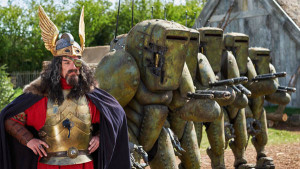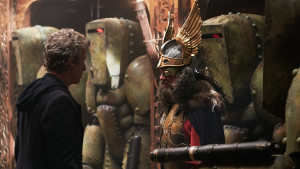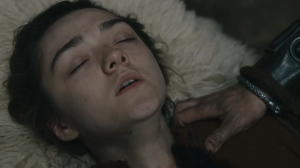Welcome Whovians, to the new incarnation of Who·ology here on Reel World Theology. Unlike the return of Missy to this season of Doctor Who, we have reasons for the regeneration of this weekly feature from podcast to written review, but suffice to say, we still love Who and still plan to bring you our take on it each week to hopefully stir some discussion. So let’s get to it!
 I don’t know if you watched Outlander, the Vikings meet aliens movie I recommended at the end of my review last week, but I can tell you this- it doesn’t end with the good guy defeating the bad guys with a host of zany booby traps and comedic trickery. That is, however, what we got in this week’s episode. Yes, welcome to Home Alone: Doctor Who!
I don’t know if you watched Outlander, the Vikings meet aliens movie I recommended at the end of my review last week, but I can tell you this- it doesn’t end with the good guy defeating the bad guys with a host of zany booby traps and comedic trickery. That is, however, what we got in this week’s episode. Yes, welcome to Home Alone: Doctor Who!
I’m mostly kidding. I enjoyed this episode as a fairly entertaining one off adventure, but it did come off as rather corny. Nonetheless, we have some solid themes and character development to chew on in this episode. And we finally meet Maisie Williams’ character. Thankfully, it turns out she is not River Song. Yet.
Ashildr: “I’ve always been different. All my life I’ve known that. The girls all thought I was a boy. The boys all said I was just a girl.”
Ashildr becomes even more different than she could have imagined. Thanks to the Doctor, she becomes functionally immortal, but her fate looks to go far beyond that. If you remember back to episode two, “The Witch’s Familiar”, Davros made mention to the Doctor of a Gallifreyan prophecy that talked of the rise of a hybrid- “two great warrior races forced together to create a warrior greater than either.” We see now that Ashildr is the hybrid, and the two races are Human (Viking) and Mire. Perhaps she turns into the “Minister of War” referred to briefly in the previous episode. It’s a mystery whether she will ultimately be friend or foe.
I am intrigued by this season-long story arc. This is mainly because it has been so slight and subversive as opposed to the in-your-face approach of the past few seasons. But is also feels very 10th Doctor. Twelve is about to face the similar loss that plagued all of Ten’s run. We know this pain is coming for him, he knows it’s coming for him, and the only thing he can do is watch. This Doctor is already tired of losing people, but as we now see after this episode, he “chose” his current face to remind him that despite the odds and the rules, he saves people.
The Doctor: “A good death is the best anyone can hope for. Unless you happen to be immortal.”
 Immortality is a curious theological concept to wrestle with. Would you choose immortality if give the option? The way you are most likely to answer that question depends entirely on your worldview. Do you think this world is eternal? Do you believe in an afterlife? If you don’t believe there is life after death, then it seems that immortality would be a clear choice.
Immortality is a curious theological concept to wrestle with. Would you choose immortality if give the option? The way you are most likely to answer that question depends entirely on your worldview. Do you think this world is eternal? Do you believe in an afterlife? If you don’t believe there is life after death, then it seems that immortality would be a clear choice.
To provide a bit of a timey-wimey twist on the subject, the Doctor is like another option for an answer to the question. He’s the inbetweener, as I have mentioned in last week’s review. I think most of us would choose to live like the Doctor- thousands of years and many regenerations, but with the knowledge that you’re still mortal and will eventually one day pass away from the pain of this world. It’s almost immortality.
The Doctor: “Immortality isn’t living forever. That’s not what it feels like. Immortality is everyone else dying.”
One of the tenants of the Christian faith is the belief in eternal life. But there is a fundamental difference between immortality and eternal life. Immortality is living forever on this world, seemingly until it passes away. And this world is broken. As the Doctor points out, living on this world is all about loss. You will just lose people as you continue to live. It only amounts to pain.
Eternal life is the belief in something more; that this world is not forever, and is not where we belong. I think deep down everyone has a fear of death. We tend to fear what we do not understand, and no matter the beliefs you maintain, there is simply no physical proof of what happens when we die. But between the choice of immortality and eternal life, the only one with the hope of true goodness and grace is living eternally in the goodness and grace of God. It’s the only choice with a promise we don’t have to live up to.
 Because if you could live as long as the Doctor, you have a choice of what kind of ripples you will make. The Doctor has been debating the issue of ripples versus tidal waves a lot this season. It seems the tidal wave is inevitable. For the Doctor, he is going to do his best to save people, to make tidal waves of goodness. The story opportunity the writers have given us this season is what kind of tidal waves will Ashildr choose to make? She will have to understand the far-reaching consequences of her actions, just as any mortal one of us must. As much good as the Doctor has done, he has done a lot of bad. And some actions you just cannot run away from no matter how long you live.
Because if you could live as long as the Doctor, you have a choice of what kind of ripples you will make. The Doctor has been debating the issue of ripples versus tidal waves a lot this season. It seems the tidal wave is inevitable. For the Doctor, he is going to do his best to save people, to make tidal waves of goodness. The story opportunity the writers have given us this season is what kind of tidal waves will Ashildr choose to make? She will have to understand the far-reaching consequences of her actions, just as any mortal one of us must. As much good as the Doctor has done, he has done a lot of bad. And some actions you just cannot run away from no matter how long you live.
Next Time on Who-ology: More Ashildr, some potential swashbuckling, and… no Clara? The trailer was curiously Clara-less, and after two and a half seasons of her, boy it’d be great to have a break from her. She’ll be there, though. And so will the sunglasses. Did you actually think they were gone after being broken in half? That wouldn’t be very Moffatty. But here’s hoping for more musings on the idea of immortality between the Doctor and Ashildr.
[youtube url=”https://youtu.be/MZz0__eJuhE”]

I really liked the theme of this week’s episode. There’s a lot of stuff to chew on, especially watching how that works out or foreshadows the rest of the season. Is the Doctor going to leave Clara somewhere so that he doesn’t have to watch her die? Or has she stayed with the Doctor so long that the only way she will let him go is to die. Moffatt doesn’t seem to like killing off characters, but Capaldi’s run has been different and darker. Maybe this is his time to be exceedingly depressing (last season’s finale was, that’s for sure).
As for the episode itself, I thought the ending was good and the revelation of why Capaldi chose this face was good, but the rest of the episode was just bad (or I thought so, at least). Now I understand why you guys dislike Moffatt’s writing. It’s just kind of stupid. Now, I can look past stupid or hokey writing when it’s actually fun (Magician’s Apprentice was so much fun that I didn’t really think about the shallowness until afterwards). This I just kind of sat in disbelief thinking “They actually thought this was good enough to get made?” The humor fell flat, the Doctor’s nicknames were stupid, the fact that the villagers had never held a sword before was ridiculous (Really? None of them know how to operate a sword? Isn’t one of them a blacksmith?) It just felt forced and stupid. Even Ashidlr’s brashness in the face of the ‘Space Vikings’ felt like it was just “Oh, They’re vikings so they have to like war and stuff” (even though none of them know how to use a sword…). I actually quit watching halfway through because it was just so bad (and I had another film to watch, I returned to Doctor Who when I had nothing else to watch). The reading the Baby’s mind scene had potential, but it went on too long and just made me cringe.
Overall, this is probably the worst of the season. Good ideas and themes, but mostly just a mess until the last fifteen minutes or so (though the cold open was pretty good).
Hey Jesse, thanks for diving in!
Yeah, I think I liked the episode more than you did, and perhaps more than I let on in my review, but it definitely got hokey and corny. But sometimes Doctor Who gets that way, yet we still learn from these great themes (I always go back to the villain “The Absorbalov” as the cheesiest thing in Doctor Who, and how we still got real stakes and themes from it).
My problem with Moffatt goes deeper, as it isn’t the hokey or stupid that bothers me. I think he’s actually quite clever and smart. It’s that he packs too much clever into episodes to the point of it ignoring what the show is about, or for the sake of spectacle over substance. Like having too many sweets in one sitting. Individually the ideas are great, but packed together to the point of overflowing is only going to end badly.
All that said, however, I really think this is the best season since season 5 (11th Doctor’s first season). They are trying new things, being more patient with the stories, and even raising the stakes a little bit (still not quite enough yet).
I think once you watch this week’s episode The Woman Who Lived, you’ll see what I mean (also check out my review if you get a chance). I’m excited to see what’s ahead for this show again.